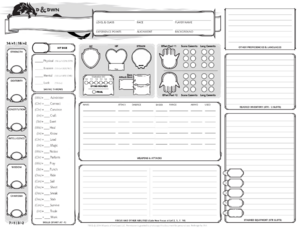(Redirected from GM:Worlds Without Number)

Dungeons and Dragons Without Number (DDWN) is not a system, it is a mindset.
Used as part of the Fantasial Freeze campaign, you'd be surprised to hear that it really is just Worlds Without Number but presented in such a way that the similarities between it and other famous RPGs such as 5e become very apparent. In gameplay other small differences are used in terminology to keep tables running with familiaritiy (such as "Dash" instead of Run, or "Feat" instead of Foci). All of this done in order to trick convince players who tend to be adverse to non-D&D campaigns to take part of the Community Campaign
Traditional 5e Elements[edit | edit source]
- HP & AC
- Identically calculated. Armor class is 10+Dex, and HP is based on level-dependent hit dice.
- 6 Ability Scores
- Identical to D&D systems, though the modifiers are slightly adjusted (3/-2, 7/-1, 14/+1, 18/+2)
- D20 Based Combat
- Rolling D20s To-Hit against enemy AC, then rolling D(4/6/8/10/12) damage dependent on the weapon, same as a 5e game.
New Elements[edit | edit source]
- Healing HP via First Aid
- Players can restore HP to each other for free via a "First Aid" action.
- This could lead to unlimited healing, except every time you get first-aid done on you, you take a Strain point.
- Skill Based Attacks
- 3 New Skills: Shoot, Stab, and Punch allow you to add extra modifiers to your attacks. If your character is great at Shooting, then it's reflected with a higher to-hit modifier.
- Strain, not Exhaustion
- In addition to HP, players have a secondary pool of points called "Strain" that is depleted whenever they undergo high stress or other bodily effects. This replaces 5e's Exhaustion mechanic entirely.
- Shock Damage
- When a hit misses, certain weapons or powers will still deal a little run-off damage, known as Shock Damage, which tends to only be 1-3 damage, but certain feats and abilities greatly increase that.
- Effort
- Instead of powers being "Once per day" or "Once per encounter" or "X per Long Rest", rechargeable class abilities function on a pool of points known as Effort Points.
- When you "Commit Effort", it means spending one of these points to do an ability. Some abilities temporarily take the effort, but give it back shortly, some will take the effort for the whole day, and others can be given and taken freely (like a toggle-able ability).
- Frailness
- If a player dies and is stabilized non-magically, they enter a new game state called "Frail". They are back to life, but even a single point of damage will permanently kill them in this state.
- Magical healing (Potions/Spells) overrules this of course and works just like 5e to get people back into battle in tip-top shape.
- Split Inventory
- Instead of juggling what you are holding at any given time, the inventory is split into 2 portions, one list contains all the items you can access for free, the other contains all the items that take an action to access (aka your stash).
Returning Elements From other RPGs[edit | edit source]
- Increased Emphasis on Feats/Foci/Powers
- While classes do have the usual class abilities, DDWN also features an increased emphasis like that found in modular systems like GURPS, where huge chunks of specific powers are locked behind Feats (called Foci), rather than as class features.
- For example: The Polymath Focus does the effects of the 5e bard's Jack of All Trades, but more than just a Bard can take it.
- While classes do have the usual class abilities, DDWN also features an increased emphasis like that found in modular systems like GURPS, where huge chunks of specific powers are locked behind Feats (called Foci), rather than as class features.
- Skill Points, not Proficiency Bonuses
- Instead of "Proficiency" automatically adding to your skills, players can manually add Skill points to their skills, much like 3.5e or Pathfinder.
- Untrained Skills
- Much like Traveller RPG, if you have no points in a given Skill, you actually roll with a penalty of -1, not a 0. Being untrained in something is a hindrance, not an inconvenience.
- Will/Reflex/Fortitude Saving Throws
- Instead of 5e's 6 saving throws, DDWN goes back to 3.5e's three types of saving throws. One for Physical Saves, one for Reflexive saves, and one for Mental saves.
- Base Attack Bonus
- Pathfinder/3.5e's Base Attack Bonus returns, with different classes getting a different flat bonus they apply to attack rolls. This replaces 5e's Proficiency bonus to attacks, and scales in a similar fashion, though differently for different classes.
- Lethal Combat
- Much like OSR games, if a player goes down in combat, they have 6 rounds to be stabilized or healed -- but the DC to do so increases every round, making it harder to bring someone back if you let them sit and die.
- Magical healing (Potions/Spells) overrules this of course and works just like 5e to get people back into battle.
